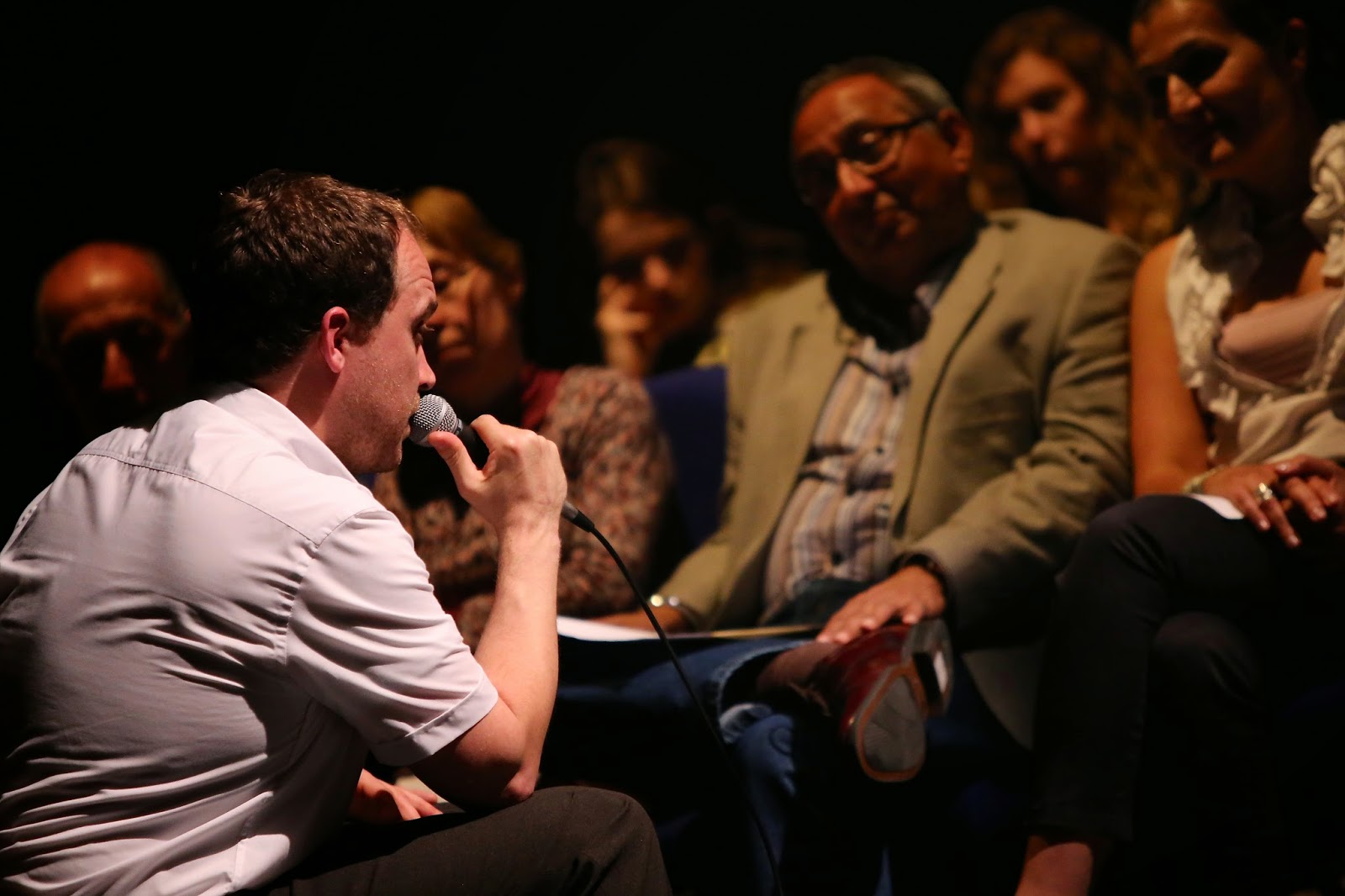'Confirmation' review or 'I think you need a new conditioner.'
Confirmation, Chris Thorpe
Battersea Arts Centre, 9th October 2014
How do we get outside our own
heads in order to understand someone else’s point of view? This sounds like the
basic point of theatre, right? Come to think of it, it also sounds like the
main purpose of the arts in general: to inhabit somebody else’s character (or
lots of characters) and take the audience or reader with you. This is the aim
of Thorpe’s latest mind-bending and heart-prickling show, ‘Confirmation’, in
which Thorpe attempts to understand and even inhabit the mind of a white
supremacist. It is a painful and deeply provocative process.
Thorpe has always traded on
his natural likeability as a performer and used it to startling effect. In ‘There
Has Possibly Been An Accident’, Thorpe’s fluid and frank tone as a narrator, as
he calmly rattled through a chain of seemingly innocuous events which would
ultimately lead to disaster, soothed the audience and stopped us from
anticipating this devastating outcome or guarding against it. Thorpe’s innate ‘niceness’
helped the audience ease into the role of passive spectator, which is pretty
bloody important in a show which toys with the idea of free will and fate.
In the ‘Oh Fuck Moment’,
Thorpe and Hannah Jane Walker disarmed us with their humility and sheepishness.
They exposed their own vulnerabilities in order to allow us to expose our own. A
similar sense of ease and openness was cultivated in Thorpe and Jane Walker’s
show, ‘I Wish I was Lonely’, which explored the invasive impact of technology
on our sense of self and community. Gently guided by Thorpe and Jane Walker’s gentle
performance style, we began to naturally foster a sense of community and trust within
the audience - the very type of instinctive togetherness and communal support
that Thorpe and Jane Walker fear is being lost.
In ‘Confirmation’, Thorpe
begins by playing ‘himself’ (or a version of himself) and gradually, and then
jarringly and really quite violently, jumps between his own thoughts and those
of white supremacist Glen (not his real name but still based on an all-too real
person). Thorpe prepares us with a quick psychological test, involving a series
of numbers and the supposed connections between those numbers; a connection
which is in, in reality, only ‘true’ because we, the audience, desire these
imagined or personal connections to be confirmed.
Thorpe explains that the
confirmation bias is a term used to explain the way in which we favour
information that confirms our beliefs. That’s why we read the papers that fit
most comfortably with our own political perspective. It is why we pick
like-minded friends and gravitate towards jobs that confirm, rather than
question, our outlook on the world. It is why most people walk around thinking
they are right and the world is wrong, rather than the other way round. It is
also why we find it so hard to understand people who do not conform with our beliefs.
Put simply, we are wired not to agree with or honour these ‘wrong’ views - and
that kind of dense wiring is very tricky to untangle.
Director Rachel Chavkin (of
the phenomenally probing theatre company TEAM) does a sharp yet subtle job of suggesting
the struggle that Thorpe experiences, as he talks with and tries to understand Glen.
The stage space tingles with aggression and hints at Thorpe’s intellectual
tussle but perhaps, also, Glen’s gradual invasion of Thorpe’s head space.
Thorpe uses the microphone in a very particular way and frequently flicks the
mike lead over the chars placed in the centre of the bare stage (we the audience
are seated in a circle around this space). Often, the mike lead whips up close
to the audience – a physical threat, but one that is never fully realised. The
chairs also become symbols of aggression. As Thorpe spends more time with Glen,
the chairs get drawn into the struggle. These are such slight movements but
they mean a lot in a show this tight, intense and visually economical. At one
point, Thorpe lifts the chair above his head – and the violence that little
lift promises is really quite frightening.
Then there is the way that
Thorpe uses the volume of his speech. At the beginning – as with at the start
of many of Thorpe’s shows – we are hit by a barrage of words. It is hard to get
a hold on what Thorpe is saying and it feels a bit like being slammed in the
face with a dictionary. Gradually, though, some sense begins to rise up from
that vocal onslaught. Isn’t it interesting, suggests Thorpe, how event the most
aggressive of speech can serve a purpose – if only you sit and listen for long
enough?
Thorpe engages with his
audience with such sophistication and ease. I’m not sure I’ve ever seen a
performer who the audience wants to like so badly; and what an incredible skill
that is to have, when trying to get us to understand or at least engage with
the very people who might normally abhor us. Thorpe places his chair right up
against the front row and asks people to read out various quotations. Sometimes
the audience members take on Thorpe’s personality and at other times they take
on white supremacist Glen’s. Personality becomes an exquisitely fluid thing. We
begin to contemplate the subjectivity of our own judgement and just how
different words feel, according to who utters them, what they look like – and where
they are seated in relation to us.



Comments
Post a Comment